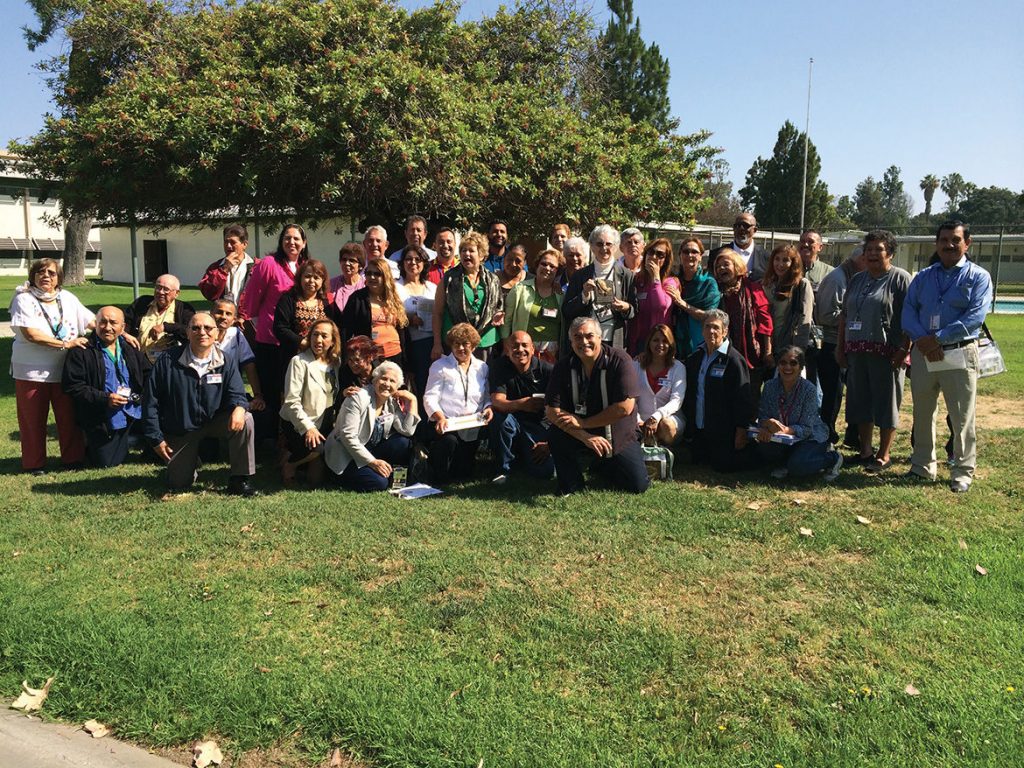Sister Teresa Doherty has done her time. Yet after 40 years, she isn’t looking to get out any time soon.
Sister Teresa of the Religious Sisters of Charity has accompanied countless incarcerated youth as the Catholic chaplain at Los Padrinos Juvenile Hall in southeast Los Angeles (Downey). Last month, the Los Angeles Probation Department presented Sister Teresa with a plaque for her 40 years of service.
She was the first Catholic chaplain at Los Padrinos and is likely the longest serving chaplain at any detention center in the United States.
“You know, the time goes by and you’re there and the volunteers are there and the work is to be done,” she told The Tidings. “I have good health, thank God, and so I’m able to continue.”
Sister Teresa didn’t even know Los Padrinos existed when she first arrived in California in 1958, after professing her final vows with the Religious Sisters of Charity in Dublin, Ireland. She taught in San Fernando Valley schools and even back in Ireland for years before settling into prison ministry at Los Padrinos.
Today about 50 of Los Padrinos’ 220 youth are involved in Catholic ministries. With the help of some 150 volunteers, Sister Teresa is able to offer Sunday Mass and Bible studies on Sundays and Wednesdays. Three priests visit the facility each week to hear confessions and offer spiritual direction. Sister Teresa also offers preparation for the sacraments.
The youth who are involved in Los Padrinos’ Catholic ministry come from a variety of backgrounds; some haven’t been to church in years and others don’t know what the Catholic Church is about and are just plain curious. Regardless, Sister Teresa is there to listen to their stories and support them during their time at Los Padrinos.
Sister Teresa has witnessed many changes — some good, some bad. She refers to her first years as “a glorious time” when she and her volunteers could minister to the youth any time during the day. Under new regulations, Sister Teresa and her team are only allotted about three hours with the youth after school each day.
She is also troubled by obvious racial bias in youth incarceration. Hispanics make up more than half of Los Padrinos’ 220 youth, while most of the other half is black.
“There can be a bias in the way kids are being incarcerated,” Sister Teresa warned. “[Authorities] are too quick to arrest them and bring them in.”
She said several young people have served a mandatory 72 hours before going to court — only to be released because of a misunderstanding. Sister Teresa suggested the United States adopt an approach of restorative justice in dealing with minor offenses.
She said several countries bring the victims and the perpetrators together outside of court to make amends with the help of a moderator. The money saved from avoiding court and attorney fees can be put toward after-school programs, she said.
But overall, the number of young people at Los Padrinos has dropped significantly since Sister Teresa began her ministry. She said there were some 700 youth when she started. Sister Teresa credited the drop to a growing number of programs that support young people who have served time in juvenile halls.
Sister Teresa is also pleased with the attention Pope Francis has drawn to prison ministry. The pope has washed the feet of prisoners during every Holy Thursday Mass of his pontificate. He also frequently prioritizes prison visits during papal trips.
In March, the pope visited a prison in Naples and reminded inmates that God is rich in mercy and love.
“I think it’s a new day for the Church,” she said.
Sister Teresa seems to be following in the footsteps of Venerable Mary Aikenhead, who founded the Religious Sisters of Charity in 1815 in Dublin to serve the suffering poor. Mother Mary Frances and her sisters were reportedly the first women religious to visit prisoners in Ireland.

